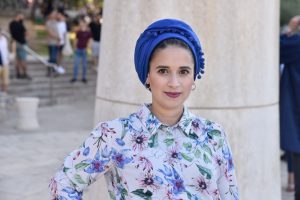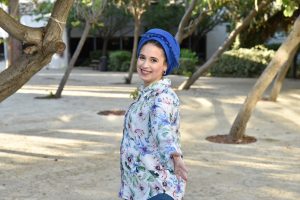Trailblazer: Bareqet Earns Technion Degree
As an ultra-Orthodox young girl, Bareqet Hadad never dreamed of studying at the Technion; but life is full of surprises. Earlier this month, the mother of three – who already holds her second job in the industry – became a graduate of the Faculty of Industrial Engineering and Management
Bareqet Hadad got married at the age of 18, and after giving birth to her first child, the next step seemed clear: studies at a religious college to become an English teacher. She grew up in an ultra-Orthodox community, finished high school with a complete matriculation certificate and discovered that she was good in English. But one evening, while she was on her way to friends in Haifa, her husband stopped her and said, “Bareqet, here’s something that looks interesting.” It was an advertisement for graduates of Beit Yaakov School for girls who want to study for a degree at the Technion.
“It was a possibility that I couldn’t have imagined,” she said several days after receiving her bachelor’s degree from the Technion. “I came from Haredi education and never thought that studying at the Technion was an option for me. But I called and discovered that there was an opening in the pre-academic course for ultra-Orthodox women at the Technion.”
From Torah to industrial engineering
Bareqet grew up in Elad. “At home, studying was at the forefront – general studies for girls, Torah studies for boys. When I decided to take five units of English I needed special approval, and together with four other girls I took the matriculation exam and passed. I also wanted five units in mathematics, but I had to be satisfied with three, so the preparatory program opened an unexpected opportunity for me.”
At the start of the course at the Technion, Bareqet felt that she was back in her natural setting – studying with other women. “Not that it was easy. The studies are high-level and very intensive, but from the beginning, I felt a guiding hand from above. The lecturers were simply amazing and did everything they could to help us succeed. I insisted on understanding every detail and their door was always open, even after study hours.”
And then – a second pregnancy. “I remember struggling. It was difficult and challenging. I studied day and night, and fortunately the director of the course at the time Mooly Dotan gave me all the help I needed, including mentoring at the Technion and externally, anything that could help me finish the course. Without Mooly’s help I wouldn’t have been able to finish the course.” Bareqet successfully passed the pre-academic program and gave birth to her second son a few days later. Now she was ready to become a full-time Technion student, strengthened by her success in the program.
Bareqet chose the Faculty of Industrial Engineering and Management – and dove right in. “The path was clear, but I knew the road was difficult,” she said. “Sitting in a mixed classroom, men and women – was a very new experience for a woman from an ultra-Orthodox background. But I learned that to succeed you need partners, and the task is to study and nothing else, so why not? Ultimately, it was an important lesson for me.”
Bareqet chose as many courses as possible related to manufacturing. “This is the field that interested me most, because my father worked in sales in companies that developed and manufactured, so that was present in my life growing up,” she explained. “When you add to that my love for communicating with people, identifying problems, situation analysis and creating solutions – you get the Manufacturing and Service Systems Program.” So, she deepened her study into various topics, among them productivity and maintenance quality, quality engineering, industrial engineering incidents, service systems engineering, and production systems.
“On the personal level, studying at the Technion was a roller coaster. I started the first semester enthusiastically. At first everything went smoothly, it was all fresh in my mind from the preparatory course, but as the weeks went by the intensity grew and so did the workload. At some point I understood that I wasn’t keeping up, I was starting to hand in work late, but I continued, sat for exams…and then suddenly – fail, fail, and another fail,” she recalls. “At this point, just before registering for the second semester, I broke down. My husband and I realized that maybe we were wrong, that maybe it wasn’t for me. In the morning we dropped the children off and sat on a bench, shattered, trying to come to a decision. At that time, we lived in the Technion dormitories, and we knew that stopping my studies meant leaving the dorms – and how would we get by?”
Top of the world
Bareqet decided to stop for a semester, to think and get organized, and then she returned. “I realized that life had toughened me up and I came back ready for the winter semester – my second at the Technion.” Here, Galit Eisig came into the picture. A counselor at the Technion’s Student Counseling Center, she accompanied Bareqet throughout the semester, and the trailblazing student passed all her exams the first time around, no need to retake them. “I felt on top of the world. It gave me the strength to continue.”
Her final project, which took the entire academic year, took place at Strauss, under the guidance of Dotan Rodensky, a faculty lecturer and CEO of consulting firm IE&P Group. Rodensky worked with the Technion Entrepreneurship & Innovation Center, and so the project had two teams – from the Faculty of Industrial Engineering and Management, and a team of four students from the Henry & Marilyn Taub Faculty of Computer Science, who provided artificial intelligence-based solutions. “Dotan’s guidance helped me submit an excellent project and we presented an end-product that will help Strauss’ excellence team,” says Bareqet.
In summary, she says, “there’s no doubt that the effort was worth it. Today I see that what they say about us, Technion graduates, is true: we stand out, we are equipped with an array of relevant skills for industry. Today, I am already in my second position in the industry, and I can quickly enter any role, work on the most complex production floors with the most advanced production lines. The skills that I learned at the Technion – thinking, analysis, systemic approach – are reflected in the field.”
Bareqet completed her degree with a third child, and let’s not forget that on the way, there were Zoom studies while holding children. “All this required me to improve my time management and planning. I also keep the Shabbat, so I have to be much more efficient during the week. I think that the Shabbat enabled me to survive the rest of the week. I learned how to manage myself on a daily basis, to ask for help, for advice, even to ask a hundred times until I’m sure I understand, to submit work on time, and think two steps ahead.”
Her belief in a guiding hand from above made it possible to overcome everything. “It’s a belief that gives enormous power to overcome small and big obstacles.” She has no doubt that there is no way she could have been able to get her degree without the tremendous help of her husband, a Yeshiva student and Torah Scribe, who took upon himself most of the care for their children. “During that time, he was also studying for accreditation exams of the Chief Rabbinate, and I’m happy that he passed them successfully at the same time as I did.”
The near future is completely obvious to her. “I have no doubt that I will be integrated in a senior position in the operational excellence division of a large enterprise like Strauss, a large company or a leading consulting firm. I will have a black belt in training for excellence and will be involved in projects that reach the CEO level,” she says.
An exceptional university in terms of support
The Technion, she says, is “an exceptional university in terms of support. I always remind myself that no matter how much and what we are given, in the end we, the students and graduates, have to meet the challenges by ourselves. No one will be tested in my place, and no one will be interviewed in my place. And yet – the help was and still is essential. Accommodation in the dormitories was critical both economically and in terms of proximity to the faculty. The scholarships, with which I received the immense support of Naama Dror from the Office of the Dean of Students, were a great help. The lecturers, the tutors, dedicated their time far beyond the formal definitions. And finally, Iris Moshkovitz, who we were fortunate to have thanks to Mooly and the Technion. Iris, an expert in business communication and career success, give us VIP service even after graduation in helping to find a job, CV, preparation for interviews, accompaniment in entering a new job and LinkedIn skills, and all with exceptional professionalism. That’s a great help.”
“Bareqet has shown remarkable determination, dedication to achieve her goals, and coping abilities,” says Mooly Dotan of the Technion Center for Pre-Academic Education. “Throughout her studies, she experienced several crises but managed to rise above, to complete all her assignments and finish her studies admirably as a woman with a family and mother of three. She is a Technion graduate and as such she deserves all the accolades,” he said. “More and more ultra-Orthodox girls are now showing an interest in studying engineering and medicine at the Technion. They are accepted in the regular admission process, like any other student, according to the “sechem” grade (average of matriculation exams and psychometric exam grades). Some of the ultra-Orthodox students choose medicine and some go to other faculties.”
Today, there are 100 ultra-Orthodox men and 20 ultra-Orthodox women studying at the Technion. Bareqet is one of the pioneers, and she hopes to influence girls in the ultra-Orthodox community and at least to present them with the possibility to study engineering, sciences, and medicine at the Technion.




